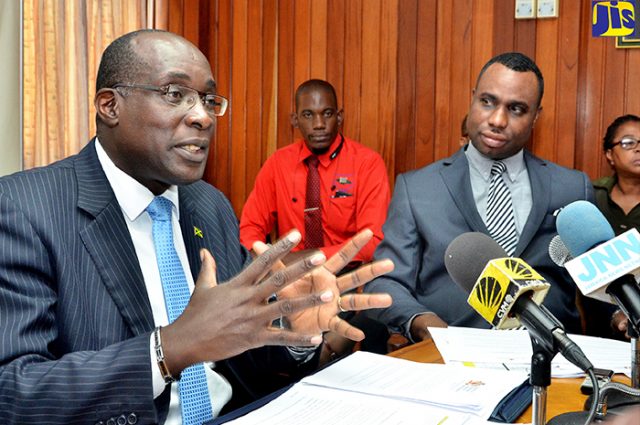JIS: JAMAICA has recorded an increase in mathematics passes in the May/June 2017 sitting of the Caribbean Secondary Education Certificate (CSEC) examinations, but there has been a drop in sciences and English Language passes, Education Minister Senator Ruel Reid has disclosed.
Of the 33,799 students from public schools who wrote the examinations, 22,566 attained grades one to three passes — 13,890 females and 8,666 males.
However, the total subject entries for males was 80,249, of which 76,045 sat the exam with 49,514 attaining grades one to three passes; while the total subject entries for females was 115, 249 of which 112, 262 sat the examinations and 80,530 received grades one to three passes.
Reid pointed out that 34 subjects were sat and 18 showed improved pass rates over 2016.
For public schools, while mathematics recorded a 50.2 percentage pass higher than last year’s 47.7 per cent pass, resulting in a 2.5 percentage point increase, English language recorded a 70.8 percentage pass, 0.4 percentage points down from last year’s 71.2 percentage pass.
However, in the islandwide performance English language had a 65.8 percentage pass, one percentage point up from last year, and mathematics had a 42. 0 percentage pass up from 41.0 last year.
The passes for English literature in public schools also decreased, moving 13. 2 percentage points down from a 68.5 per cent pass rate to 55.3 a per cent pass rate. For all schools, literature passes were 54. 2 per cent, down from 67. 5 per cent.
On closer examination of the data sheet, all science subjects sat, except human and social biology, showed a percentage pass decrease, compared to last year.
Human and social biology moved from a 52.5 per cent pass rate in public schools to a 55.3 per cent pass rate, while islandwide 53.4 per cent passed, up from 51. 0 per cent in 2016.
For biology in public schools, of the 6,295 students who sat the examination 69.7 per cent passed, indicating a decrease from an 81.7 per cent pass rate last year from 6,098 students.
In chemistry, 54.1 per cent of the 5,518 public school students who sat the examination passed, down from a 57. 1 per cent from 5,305 students in 2016.
Integrated science saw 51.6 per cent of 5,910 students passing the examination, compared to 52.3 per cent of 5,782 students last year. Physics recorded a 58. 6 per cent pass from 5,415 students, down from a 63. 2 per cent pass from 5,141 students in 2016.
Overall, the science figures were no different as biology saw a 67.2 per cent pass, down from 79.1 per cent; chemistry recorded a 49.1 per cent pass, down from 51.4 per cent; integrated science had a 51.0 per cent pass, down from 52.0 per cent and physics showed a 54.8 per cent pass, down from 59.2 per cent.
To help improve this matter, Reid said the Ministry of Education has been aiming to strengthen teacher competence at earlier stages in the education system by bringing more technology and having labs within primary schools.
At the high school level, he said work is being done to change the approach of teachers and students to learning, as “all the questions for science are application, and not just recall”, explaining that some questions require practical knowledge of real-life situations which many students are not exposed to. As a result, teachers will have to look at a more hands-on approach to teaching and learning, he said.
Economics had the highest percentage increase, moving from a 71.7 per cent pass rate last year to 84.1 per cent.
There were also increases in the pass rate for additional mathematics, agricultural science (double and single awards), principles of accounts, information technology, technical drawing, and theatre arts.
Additionally, five subjects — agricultural science (double and single award), principles of business, physical education and sport as well as food and nutrition — had average pass rates of more than 90 per cent.
Meanwhile, the education minister disclosed that the Caribbean Advanced Proficiency Examination (CAPE) saw an average pass rate of 89.8 per cent, compared with 86.6 per cent in 2016.
He further explained that Unit 1 had a total of 41,948 entries of which 39,463 were sat with a pass rate of 88.9 per cent; and Unit 2 had 17,792 entries, of which 17,005 were sat with a pass rate of 91. 8 per cent.
Reid added that for public schools Unit 1 one showed an increase of 2.4 percentage points over the previous year and Unit 2 registered a 5.7 percentage point increase, compared to 2016.
The minister said there were four new subject areas — financial services studies, green engineering, performing arts (cinematic arts) and performing arts (music).
Moreover, 23 subject areas for CAPE showed improved performance. Notable increases were shown in electrical and electronic technology and integrated mathematics of 29.6 and 28.8 percentage points respectively.
Applied and pure mathematics had a decline of 7.8 and 1.9 percentage points, compared to 2016.
CAPTION: Education Minister Senator Ruel Reid speaks on Jamaica’s performance in the recent sitting of the Caribbean Secondary Education Certificate and Caribbean Advanced Proficiency Examinations at a press conference held Friday at the Ministry of Education MOE, Heroes’ Circle, Kingston. To his right is permanent secretary in the Ministry of Education, Dean-Roy Bernard. (Photo: Joseph Wellington)


